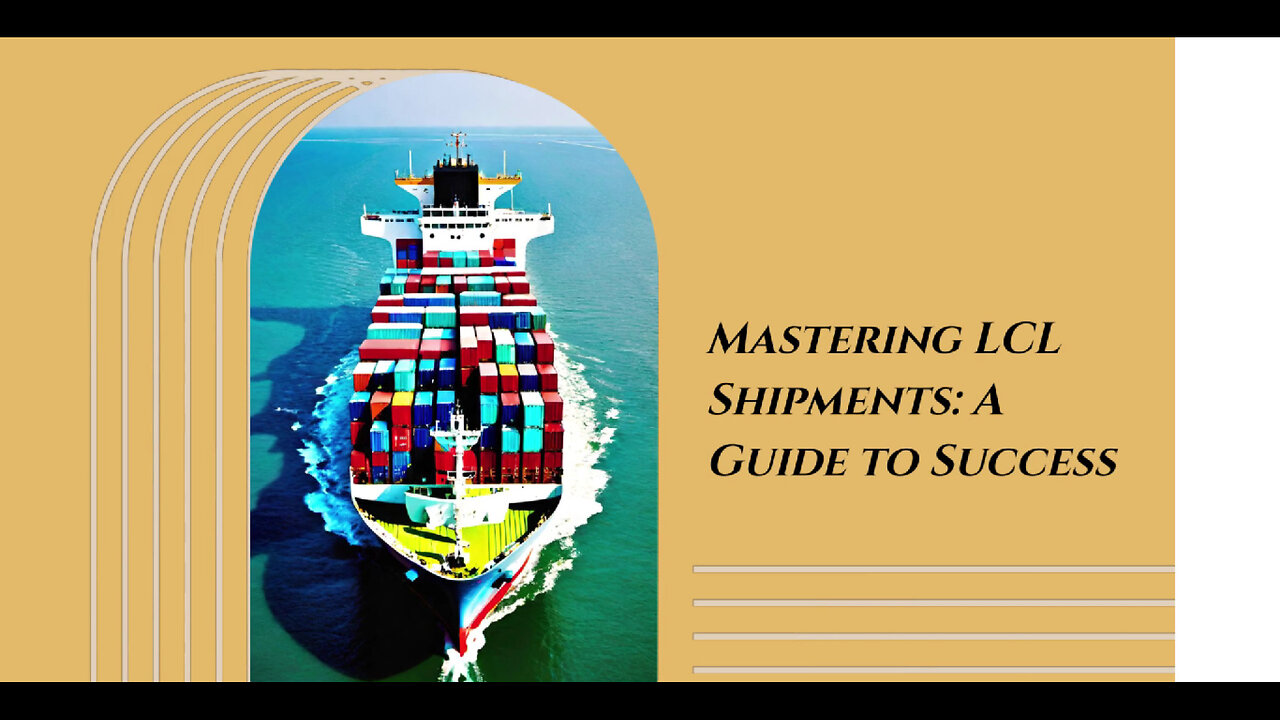Premium Only Content

Mastering the Art of LCL Shipments: Customs Bonds, ISF, and More!
ISF Filer || isf@isffiler.com || 858-280-9374 || www.isffiler.com
This response discusses the essential steps for setting the foundation for successful Less than Container Load (LCL) shipments in customs brokerage. It emphasizes the concepts of understanding LCL shipments, customs bond requirements, Importer Security Filing (ISF), working with a customs broker, proper packing and labeling, and timely documentation submission. By following these steps, businesses can ensure a smooth and efficient LCL shipment process while minimizing risks and avoiding unnecessary complications or delays.
- Understanding LCL shipments: LCL shipments involve consolidating smaller shipments from different importers into a single container, allowing for cost sharing and affordability for smaller volumes of cargo.
- Customs bond requirements: A customs bond is crucial for LCL shipments as it guarantees compliance with all import laws and regulations. Obtaining a customs bond beforehand helps avoid delays or issues at customs.
- Importer Security Filing (ISF): ISF is a requirement by US Customs and Border Protection (CBP) for ocean cargo shipments. Importers or their customs brokers must submit specific information about the shipment before it arrives, including details about the cargo, shipper, and consignee.
- Working with a customs broker: Partnering with a customs broker is highly recommended for LCL shipments. Customs brokers' expertise in customs regulations and procedures helps with preparing documentation, filing the ISF, and coordinating the entire shipment process to avoid delays and penalties.
- Proper packing and labeling: To ensure the safe transportation of LCL shipments, each cargo should be securely packed to prevent damage. Clear labeling with essential information such as contents, handling instructions, and importer details ensures proper handling throughout the shipping process.
- Timely documentation submission: Prompt submission of accurate documentation, including commercial invoices, packing lists, and required permits or certificates, is crucial. Delayed or incomplete documentation can cause customs clearance issues and shipment delays.
By following these steps, businesses can establish a strong foundation for successful LCL shipments. This helps streamline the process, mitigate risks, and ensure that cargo reaches its destination without unnecessary complications or delays. Stay tuned for more upcoming videos in our customs brokerage series!
#usimportbond
#isfcustomsbroker
#uscustomsclearing
#isfentry
Video Disclaimer Here: This video is intended for educational purposes and has no affiliation with US government entities.
0:23- Understanding LCL Shipments
0:46 - Customs Bond Requirements
1:02 - Importer Security Filing (ISF)
-
 2:38:38
2:38:38
TimcastIRL
6 hours agoTrump Orders DOJ To FIRE EVERY Biden Attorney, Calls For CLEAN HOUSE w/Siaka Massaquoi | Timcast IRL
120K73 -
 1:29:31
1:29:31
Glenn Greenwald
9 hours agoGermany's Repressive Speech Crackdown Intensifies; U.S. & Russia Meet in Saudi Arabia and Open Cooperation; Plus: An Amazing Hate Crime in Florida is Buried | SYSTEM UPDATE #408
89.2K54 -

DLDAfterDark
3 hours ago $1.06 earnedDLD Live! What's Your Typical EDC/Civilian Load Out? Guns & Ammo & EDC?
13.9K1 -
 1:30:48
1:30:48
Redacted News
10 hours agoBREAKING! TRUMP AND PUTIN NEARING PEACE BUT EUROPEAN WARMONGERS TRYING TO STOP IT | REDACTED
178K249 -
 52:40
52:40
Candace Show Podcast
10 hours agoSaturday Night Lively: What Were They Thinking? | Candace Ep 148
151K151 -
 3:30:06
3:30:06
Man in America
6 hours agoDocumentary: The Money Masters 'How International Bankers Gained Control of America'
40.2K11 -
 1:10:40
1:10:40
PMG
1 day ago $1.91 earnedTom Hanks Plays a Racist MAGA Supporter On SNL!! UNBELIEVABLE
19.5K3 -
 2:11:29
2:11:29
Adam Does Movies
9 hours ago $1.64 earnedAsk Me Anything - Live!
27.5K1 -
 56:18
56:18
Flyover Conservatives
1 day agoFollow the Money: $4.7 Trillion in Government Fraud EXPOSED!; Flu Shots, Fear & Big Pharma Lies—What They DON’T Want You to Know - Dr. Stella Immanuel | FOC Show
32.5K1 -
 1:16:24
1:16:24
Anthony Rogers
1 day agoEpisode 354 - Current Events, Weather, and Other Clickbait
34.7K2